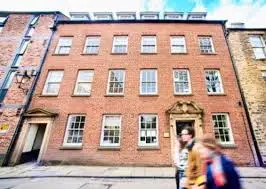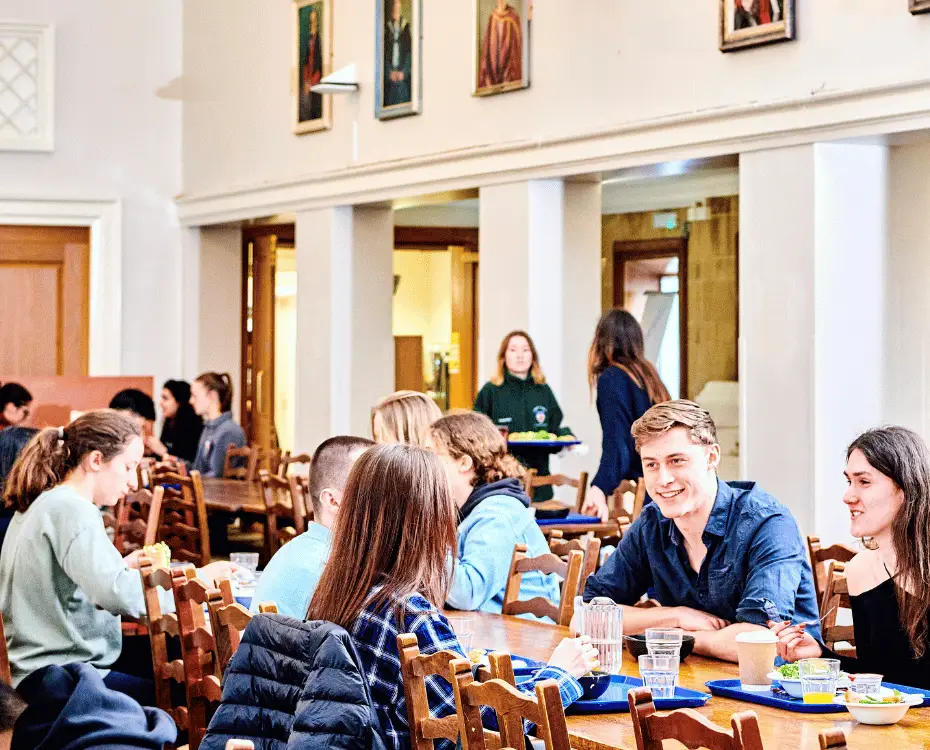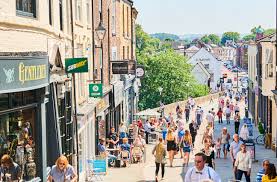Key takeaways
- Durham known for collegiate system and historic setting
- Strong academic reputation
- Traditional university culture
When looking at universities to apply to, there are a number of factors you might take into consideration. How big is it? Is it modern? Social? Close to home (or maybe far away from home)? But certainly, the most commonly asked question by prospective students is always, is it a good university? This might mean different things to different students, whether that be facilities, teaching, night life, accommodation, or reputation. This article will aim to give you an overview of life at Durham University, to help hone your judgement, and decide whether Durham’s any good, and, more importantly, whether it’s right for you.
An overview of Durham University

Durham University is located in Durham in the North of England. The university – as we know it today – was founded in 1832 by an Act of Parliament, as a Church university. Initially, it was established around 1286 to 1291 by the Benedicte monks of Durham, this was just 600 years after the establishment of the University of Oxford and Cambridge. As such, it’s the third oldest university in the UK.
Today, Durham University offers one of the broadest ranges of courses in the UK with over 200 undergraduate degrees and over 100 postgraduate degrees. They are a ‘target uni’ so businesses will come to the university to offer opportunities for graduates.
How does Durham University rank?
Anyone who has considered attending Durham University will know that, when looking at the figures, yes, Durham University is a good university. For the year ahead, Durham has been ranked 5th in the UK by both the Complete University Guide and the Times Good University Guide, and Durham is frequently featured in the Top 100 universities worldwide. But what a quick google and league tables don’t tell you is what life at Durham University is really like.
I have recently completed my third year at Durham, and have loved my time here. Still, no university is perfect, and every university experience is unique. I certainly engaged in many aspects of uni life, but not all. Still, using my experience at Durham, this article will give you an overview of the university from a first-hand student – facilities, accommodation, social life, and an explanation of that tricky college system – for you to decide whether those rankings really hold up.
Facilities at Durham University
I studied History during my time at Durham, and the facilities were great all-round, if slightly dated. The lectures theatres varied greatly in size, from 25-odd capacity to 200. They were bright, and comfortable, and right in the centre of town. This was ideal for getting to class as someone who’s always running late. Sure, they weren’t quite like the swanky new business school that’s just been built for the university, or the shiny law school, but I liked them all the same. The History department itself is a labyrinthine building set on Durham’s historic North Bailey. Think the Weasley home in Harry Potter, but make it offices and seminar rooms – cosy, if slightly difficult to navigate.

The university’s central Bill Bryson library contains 1.6 million printed items, and just under a million electronic resources. This library is open to any university student, so is perfect for studying with friends who aren’t on your course. The Bill Bryson (affectionately known as the Billy B) isn’t the only study space for students looking to cram during exam season. The modern and spacious Teaching and Learning Centre has a great cafe, and the Barker Research Library in Palace Green is perfect for quiet study. The city is scattered with a variety of study spaces for students at the university, which really gives you the options to study however best suits you.

Social life at Durham University
For such an academic university, you might assume that the social life at Durham is non-existent. Surprisingly, the university has something on offer for almost everyone. The fresher’s fair is the best place to start – from music to sport, to theatre and even curry, there is a vast range of societies at Durham.
Although I have not been involved in the culture at uni, Durham is widely regarded for its sporting culture and facilities. One of the best things about the sports at Durham is that anyone can play, whether you’re a social member of a society, or a national-level athlete playing for the university-wide team. The collegiate system also makes sports at Durham more accessible – if you don’t fancy the commitment of a DU (Durham University) team, or don’t make the try-outs, you can play for your college team instead, in a more casual setting.

Durham also has the largest student theatre community in the UK, with companies at university level and college level. Productions are plentiful and year-round, ranging from musical theatre to student writing, improv, and comedy. If music is more your thing, there are bands in almost every college and in a wide range of genres, so whatever your instrument, there’s something for you. Communal singing is also a great opportunity to meet new people – there are large-scale choirs, chapel choirs, gospel choirs, and acapella groups, including the reigning world champions!
The Junior Common Room is the undergraduate body within each college at Durham, and is another great way to get involved in university life and meet new people, and this mini-democracy is something relatively unique to Durham’s collegiate system. Essentially, at a university where it’s easy to get swept up in academia, there’s something for everyone, if you choose to look for it.
Accommodation at Durham University
In a similar vein to the social life, and the facilities, I think that what makes the university accommodation at Durham good, is the range of options available to incoming students. Durham has 17 colleges in total, including 1 that is exclusively for post-grad students. Six of the colleges are self-catered, nine are fully-catered, and two have both options. I personally chose a self-catered college, because I enjoyed the flexibility of eating on my own time (2am instant noodles hello), but for some, the convenience of having a cooked meal waiting is preferred.

Each college has its own unique identity and values: there’s Collingwood, noted for its sport, St John’s is known for being particularly religious, and Castle is the one that everyone puts as their first choice because it’s pretty. Fair enough. One important thing that I will say about the colleges is that there tends to be a real divide between those on the Bailey, in town, and those on the Hill, slightly further out. While the Bailey colleges are certainly closer to town, the majority of the rooms in first year are shared, which is why I went for a college that was further out. For some people, that would be fine, but for me personally, it was a total deal-breaker.
Finding housing in Durham if and when you leave college after your first year is another story altogether. While students in other universities may choose to sign a house in the spring for the following academic year, most students in Durham have their housing sorted by mid-October of the previous year. This often means sorting housing as soon as you arrive as a fresher, which can be very stressful.
Durham city
One thing you should know before coming to Durham is that the city itself is small, like, very small. Still, there are things to do if you know where to look. There are gigs at local pubs, the Fringe festival that runs every Summer, a local theatre, and events at the Cathedral, which is almost 1000 years old. Durham is certainly a sleepy city, but it’s pretty, and it has good transport connections. Newcastle is a 15-minute train journey away, and York is just 45 minutes in the opposite direction. If you have a car, the surrounding rural areas are even better. There are castles and historic sites dotted all over the Northeast, if you like that sort of thing. Getting away from the university environment is as simple as stepping on a bus or a train.

Durham boasts Europe’s worst nightclub (it used to be second worst but the club in first place burnt down), and that pretty much sums up the nightlife here. There are a handful of clubs, all within about a 10-minute walk of one another, but they all play very similar music. If you’re looking for anything that’s not sing-along pop music in the club, you’d be hard pressed to find it in Durham. If you have come from a city larger than Durham, I would go as far to say you’d be disappointed by the nightlife. Still, the pubs and bars are good, with a few staples that remain famous among students, year-in, year-out.
So… is Durham a good university?
Overall, Durham is a good university, but your experience is what you make it. My experience in self-catered accommodation, in a non-sharing room, would’ve been very different to someone who stayed on the Bailey and had to share with a stranger. I also don’t benefit from the investments of new facilities at the university like students who do other degrees. Coming from a big city, Durham was surprisingly small to me, and I certainly struggled with this in the first year of my degree.
Furthermore, Durham has its own issues with inclusivity and diversity. Wayzgoose magazine recently found that 90% of survey participants believed Durham’s reputation for discrimination was worse than other universities in the UK. The university certainly has issues with elitism that needs to be addressed in a more serious way. So, how good is Durham? That’s up to you to decide.
What do other students think of Durham University?

According to Student Crowd, the university is ranked 20th in the UK. Some reviews of the students:
- “Durham University is a great university. It offers an exceptional learning experience, with class learning facilities. It offers various extracurricular fitting to every student.”
- “Very strong professional, easy to assess any online material, the staff is very helpful and friendly.”
- “Durham is currently going through a housing crisis, so that is something to keep in mind when applying. Obviously, it is still a good university though.”
For more reviews, click here to see all the student crowd reviews and rankings.


Topic expertise: League Table Rankings, Collegiate System, Student Societies, Research
FAQs on Durham University
Durham is a world top 100 and UK top 10 university, part of the Russell Group, and famous for its research, teaching, and prestigious reputation.
Durham has a distinctive collegiate system—students join small college communities for accommodation, social life, and support, all within the historic setting of Durham city and castle.
The university is highly rated for law, history, English, geography, business, and sciences—many are ranked in the UK top 5–10 in major league tables.
Durham boasts a superb student experience, offering high quality teaching, state-of-the-art libraries, cultural societies, and a strong sense of tradition and pride among students.
Durham graduates are highly employable with many going into top careers, further study, or international positions. The university’s reputation is widely recognised by employers globally.
The average UCAS tariff points are 224-239 but this varies between courses. The acceptance rate, from the statistics of 2022-2023 is 67%. So, whilst it's not the easiest university to get into, it's also higher than many universities, for example, Oxford's acceptance rate is 9%.
Authors
-
I’m a recent graduate of History at Durham University, and am currently studying my Master’s in History at the same uni. I love all things arts and culture, and I’m usually getting involved in music or drama in some way or other!
View all posts
-
Aminah is a dedicated content expert and writer at Unifresher, bringing a unique blend of creativity and precision to her work. Her passion for crafting engaging content is complemented by a love for travelling, cooking, and exploring languages. With years spent living in cultural hubs like Barcelona, Sicily, and Rome, Aminah has gained a wealth of experiences that enrich her perspective. Now based back in her hometown of Manchester, she continues to immerse herself in the city's vibrant atmosphere. An enthusiastic Manchester United supporter, Aminah also enjoys delving into psychology and true crime in her spare time.
View all posts





